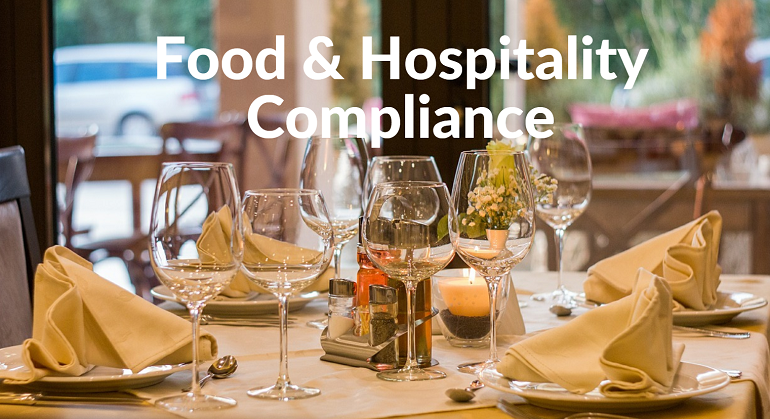

Food and Hospitality Compliances
Hospitality is a part of the large business initiative- in the Tourism industry. This industry provides a complete range of services like accommodation facilities, travel arrangements, food and beverages to leisure activities which cover all requirements a modern day traveler seeks and his purpose for travelling could be business, adventure, vacation, pleasure, religious purpose or medical treatment.
All of us are very well known to both the terms; ‘FOOD’ and ‘HOSPITALITY’, but “Hospitality” can be broadly termed as a cheerful welcoming of people, who may be known or strangers, forming a relation of ‘guest’ and ‘host’. It is a service industry to its consumers. Hospitality is a fundamental need of every traveler, pilgrims, tourists, and wanderers because it gives them a strong feeling of a ‘Home, Away From Home’!
As per British law, a hotel is a place where a bonafide traveler can get food and shelter, provided he is able to pay for it and is in a fit condition to be received. A hotel is thus a commercial establishment that provides accommodation, meals and other services to the guests. Hotels range from economical or limited service to those providing world class services.
Tewari (2009) stated that in general to be called a hotel, a building must have a minimum of six guest rooms, at least three of which must have attached private bathroom facilities. Hotels are also classified as per the star rating system, ranging from one star to five stars, with the number of facilities increasing with every star. This system of classification is accepted throughout the world, and ratings of hotels in various countries are done by the government, independent rating agencies, or sometimes by the hotel operators themselves. The hospitality industry generates a lot of employment all over the world, directly as well as indirectly for example guides and escorts, suppliers, and sellers of local handicrafts. It also brings a lot of valuable foreign exchange, as people who travel to other countries spend money on accommodation, transport, shopping, sightseeing, etc.
Restaurants are institutions that serve food and beverages to guests. These range from economy style dining halls, to fast food outlets, to takeaways, too expensive fine dining restaurants based on a particular theme.
Legal Aspects of Food and Hospitality in India
Start-up and successful running of every food business in India are governed by many laws for sanitation, Licensing, and other necessary permits. Earlier the “Prevention of Food and Adulteration Act, 1954, also known as “PFA”. With the change in requirements of the food industry, the need to change the act also became necessary.
The act which replaced “PFA” act is the Food Safety and Standard Act, 2006 (hereinafter referred to as "FSSA"). It specifically repealed eight laws which were in operation prior to the enforcement of FSSA:
- The Prevention of Food Adulteration Act, 1954
- Essential Commodities Act, 1955 (in relation to food)
- The Fruit Products Order, 1955
- The Meat Food Products Order, 1973
- The Solvent Extracted Oil, Deoiled Meal, and Edible Flour (Control) Order, 1967
- The Vegetable Oil Products (Control) Order, 1947
- The Edible Oils Packaging (Regulation) Order, 1998
- The Milk and Milk Products Order, 1992
The FSSA establishes a new national regulatory body “Food Safety and Standards Authority of India” (hereinafter referred to as FSSAI). It initiates harmonization of India’s food regulations as per International Standards. The FSSAI is to develop science-based standards for food and to regulate and monitor the manufacture, processing, storage, distribution, sale, and import of food so as to ensure the availability of safe and wholesome food for human consumption.
Necessary Licenses for Food Business in India
The FSSA is a Central act must be compiled by every Food Business Operator(FBO) in India. They must obtain an FSSAI license for their Food Business. Where India having a big market in different states must also comply with state laws for the FBOs of India. Various other laws mention the necessary approvals, licenses or certificates to be obtained from different authorities: Health and Trade license from the Municipal Corporation of the relevant area, NOC for Fire prevention and safety, environmental clearance, licensing under the police unit of the respective state/city, verification certificate under the Standards of Weight and Measurement Act,1976 for each of the outlet issues by the Department of Legal Metrology of the respected areas, registration under the shop and establishment act under the respective state, liquor license and Eating house license.
A license to play music in Restaurants/Hotels/events is also required to play recorder or live music generally issued by pplindia. It is mandatory for a food business to obtain insurance from any insurance company with regard to public policy, product liability, fire policy, building, and assets. Other insurances though are not mandatory may be useful if taken.
Registration is required under the Central Excise Act, 1944 as in respect of goods specified in the Third Schedule of the said act, repacking, re-labeling, putting or altering retail sale price, etc. will fall into the category of manufacture. Also, other licensing/certification may include registration under the Employees' Provident Funds and Miscellaneous Provisions Act, 1952 if it is engaging more than 20 employees. Subject to applicability, other statutory and regulatory compliance may also include registrations under Income Tax Act, 1861, Customs Act, 1962, Goods and Services Act, 2017 (GST) and other labor laws.



